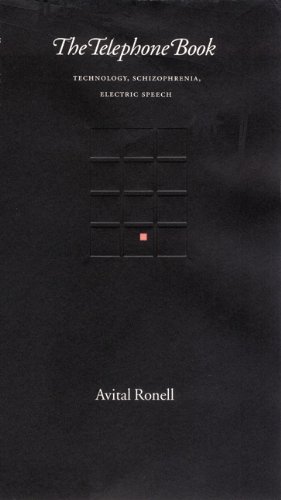Richard Sproat: Language, Technology, and Society (2010)
Filed under book | Tags: · language, linguistics, literacy, society, speech, technology, translation, writing

This book traces the history of language technology from writing – the first technology specifically designed for language – to digital speech and other contemporary language systems. The book describes the social impact of technological developments over five millennia, and addresses topics such as the ways in which literacy has influenced cognitive and scientific development; the social impact of modern speech technology; the influence of various printing technologies; the uses and limitations of machine translation; how far mass information access is a means for exploitation or enlightenment; the deciphering of ancient scripts; and technical aids for people with language disabilities.
Richard Sproat writes in a clear, readable style, introducing linguistic and other scientific concepts as they are needed. His book offers fascinating reading for everyone interested in how language and technology have shaped and continue to shape our day-to-day lives.
Publisher Oxford University Press, 2010
ISBN 0199549389, 9780199549382
Length 286 pages
N. Katherine Hayles: My Mother Was a Computer. Digital Subjects and Literary Texts (2005)
Filed under book | Tags: · cellular automata, code, intermediation, language, posthuman, simulation, speech, technology, writing

We live in a world, according to N. Katherine Hayles, where new languages are constantly emerging, proliferating, and fading into obsolescence. These are languages of our own making: the programming languages written in code for the intelligent machines we call computers. Hayles’s latest exploration provides an exciting new way of understanding the relations between code and language and considers how their interactions have affected creative, technological, and artistic practices.
My Mother Was a Computer explores how the impact of code on everyday life has become comparable to that of speech and writing: las anguage and code have grown more entangled, the lines that once separated humans from machines, analog from digital, and old technologies from new ones have become blurred. My Mother Was a Computer gives us the tools necessary to make sense of these complex relationships. Hayles argues that we live in an age of intermediation that challenges our ideas about language, subjectivity, literary objects, and textuality. This process of intermediation takes place where digital media interact with cultural practices associated with older media, and here Hayles sharply portrays such interactions: how code differs from speech; how electronic text differs from print; the effects of digital media on the idea of the self; the effects of digitality on printed books; our conceptions of computers as living beings; the possibility that human consciousness itself might be computational; and the subjective cosmology wherein humans see the universe through the lens of their own digital age.
We are the children of computers in more than one sense, and no critic has done more than N. Katherine Hayles to explain how these technologies define us and our culture. Heady and provocative, My Mother Was a Computer will be judged as her best work yet.
Publisher University of Chicago Press, 2005
ISBN 0226321479, 9780226321479
290 pages
PDF (updated on 2012-7-24)
Comment (0)Avital Ronell: The Telephone Book: Technology, Schizophrenia, Electric Speech (1989)
Filed under book | Tags: · history of technology, psychoanalysis, schizophrenia, speech, technology, telephone

“The telephone marks the place of an absence. Affiliated with discontinuity, alarm, and silence, it raises fundamental questions about the constitution of self and other, the stability of location, systems of transfer, and the destination of speech. Profoundly changing our concept of long-distance, it is constantly transmitting effects of real and evocative power. To the extent that it always relates us to the absent other, the telephone, and the massive switchboard attending it, plugs into a hermeneutics of mourning. The Telephone Book, itself organized by a “telephonic logic,” fields calls from philosophy, history, literature, and psychoanalysis. It installs a switchboard that hooks up diverse types of knowledge while rerouting and jamming the codes of the disciplines in daring ways. Avital Ronell has done nothing less than consider the impact of the telephone on modern thought. Her highly original, multifaceted inquiry into the nature of communication in a technological age will excite everyone who listens in.
The book begins by calling close attention to the importance of the telephone in Nazi organization and propaganda, with special regard to the philosophy of Martin Heidegger. In the Third Reich the telephone became a weapon, a means of state surveillance, “an open accomplice to lies.” Heidegger, in Being and Time and elsewhere, elaborates on the significance of “the call.” In a tour de force response, Ronell mobilizes the history and terminology of the telephone to explicate his difficult philosophy.
Ronell also speaks of the appearance of the telephone in the literary works of Duras, Joyce, Kafka, Rilke, and Strindberg. She examines its role in psychoanalysis—Freud said that the unconscious is structured like a telephone, and Jung and R. D. Laing saw it as a powerful new body part. She traces its historical development from Bell’s famous first call: “Watson, come here!” Thomas A. Watson, his assistant, who used to communicate with spirits, was eager to get the telephone to talk, and thus to link technology with phantoms and phantasms. In many ways a meditation on the technologically constituted state, The Telephone Book opens a new field, becoming the first political deconstruction of technology, state terrorism, and schizophrenia. And it offers a fresh reading of the American and European addiction to technology in which the telephone emerges as the crucial figure of this age.”
Publisher University of Nebraska Press, 1989
ISBN 0803289383, 9780803289383
466 pages
PDF (8 MB, added on 2015-7-21)
DJVU (9 MB, updated on 2012-8-5)

